- Home
- Lemony Snicket
File Under Page 2
File Under Read online
Page 2
“Don’t fret, Oliver,” Moxie said, although I could see that Oliver just kept on fretting. “Snicket here has a knack for finding strange missing items. Isn’t that so, Snicket?”
“It’s sometimes so,” I said. “Oliver, why don’t you tell us how the newt slipped away?”
“I don’t think it slipped away,” Oliver said. “I think it was pinched.”
“Somebody stole it?” Moxie said. “That’s a serious accusation to make.” She sat down and opened a case sitting on the floor. Inside was a typewriter that Moxie Mallahan always kept nearby, and she started taking notes immediately on the clattering machine.
“I’m making it seriously,” Oliver said. “The Amaranthine Newt lives in a special tank on a desk in my examining room, so I can always keep an eye on it. It was there when I opened for business this morning.”
“And how many patients did you have today?” I asked.
“Just one,” Oliver said. “You were right about few people having pets, Moxie, but Polly Partial has two of the last cats in town, and one of them has a narcissistic disorder.”
“Polly Partial, the grocer?” Moxie asked, and met my eye. Neither of us was fond of the woman who ran Partial Foods, but lots of people nobody is fond of have sick cats.
“Her cat Paperbag has been a patient of my family’s for a very long time,” Oliver said. “I can’t imagine that his owner is a thief, but greed and newts can do strange things to people. I examined Paperbag and went to my desk to write out a prescription. Then I escorted Partial and Paperbag out and spent a few minutes in the backyard watering my father’s zinnias. The flowers match the trim on the office, as long as you keep them healthy, and I’d like to leave the place looking nice. When I went back into the office, the tank was empty.”
“Someone must have snuck in while you were gardening,” Moxie said.
Oliver shook his head. “I would have heard anyone else driving up the road.”
“They need not have arrived by automobile,” I said.
“To pinch my newt,” Oliver said, “they’d need a similar tank. You couldn’t fit one on a bicycle or a donkey. Polly Partial must have stolen the newt, but I don’t see how.”
“I don’t mean to be rude,” I said, “but can you really trust your eyes? I notice you have not one but two pairs of glasses.”
Oliver gave me a stern, lens-covered look. “My eyes aren’t perfect,” he said, “but with these glasses I can see perfectly well, and I keep the other pair on my head for reading.”
“You don’t have bifocals?” I asked, referring to eyeglasses that combine two lenses into one.
“There aren’t any optometrists left in town,” Moxie told me. “The closest eye doctor is way over in Paltryville, but she doesn’t have a very good reputation.”
“Did you use your reading glasses when you were with Paperbag?” I asked Oliver.
He nodded. “When I wrote out the prescription.”
“Well, I’m sure you saw clearly,” I said, “but I’m not sure I do. Shall we walk over to the Sobol office?”
Oliver said yes and so we did, Moxie carrying her typewriter and me trying to think. It was a warm, breezy day, with the wind carrying a salty smell from the seaweed of the Clusterous Forest, an eerie phenomenon that lay below the cliff we were on. But we walked the other way, down a road as bumpy and cracked as a vase falling down stairs. Soon enough, we could see the office of the Doctors Sobol, a faraway building with yellow and orange trim, but when we rounded a corner, something made us stop. There was a car, pulled over to the side of the road, and a man frowning at the car like it’d given him socks for his birthday.
“Good afternoon,” I said.
“Not in my opinion,” the man replied, and used his right hand to point at one of the car’s tires. It also looked a little sad. “I seem to have a flat.”
“There’s a garage about a half mile thataway,” Moxie said, pointing thataway with one finger.
“Thank you,” the man said. “I’m a doorknob salesman passing through town, and I’m late for an appointment. I guess I’d better walk on over to the garage. My car doesn’t have anything valuable in it, so I suppose it will be all right.”
I peeked through the window of his car. I couldn’t help it. I’ve been trained to do such things. There was nothing in it.
Oliver had other concerns. “You haven’t noticed a newt crawling around, have you?”
“Or a suspicious person?” Moxie added.
“What kind of person?” the man asked. “I saw a woman driving by in a beat-up grocery van. And what kind of lizard?”
Oliver sighed in annoyance. “It’s an Amaranthine Newt,” he said, “and that woman is probably a thief.”
“A newt will be hard to find,” said the stranger. “But I might look in a patch of zinnias I passed. It could blend in and hide there easily.”
“You’re thinking of a chameleon,” I said, “but you’re probably right that we won’t find the newt. We might as well help you instead.”
“What?” Oliver said, blinking in astonishment, and Moxie frowned.
“Do you have a spare tire in the trunk?” I continued, talking to the man.
The supposed salesman shook his head. “Nope.”
“That’s too bad,” I said, “but maybe you have something that would do in a pinch.”
“I don’t think so,” the man said quickly, in a pinched voice.
“In a pinch” is a phrase which here means “in a difficult situation,” and a pinched voice is a whiny and nervous one. But neither of these pinches was the pinch I was thinking of. “Open the trunk anyway,” I said, “so we can see the special newt tank you have hidden there.”
The conclusion to “Pinched Creature” is filed under “Dishonest Salesman,” here.
RANSOM NOTE.
Bouvard and Pecuchet Bellerophon, better known as Pip and Squeak, were the best cabdrivers in Stain’d-by-the-Sea, although to be fair, they were also the only cabdrivers I’d ever come across in town. The brothers weren’t really old enough to drive—or tall enough, for that matter—so Pip worked the steering wheel and Squeak worked the brakes, and in this way they got their customers around in the taxi belonging to their father, who they’d told me was very ill. The Bellerophon brothers were valuable associates of mine, so when they told me their mechanic needed help, I agreed to ride right over to Moray Wheels, a dirty and lonely-looking garage in what had once been a bustling district of town and now sat mostly empty.
“I know it doesn’t look like much,” Pip said as his brother brought the taxi to a halt, “but Jackie’s an excellent mechanic.”
“You can say that again,” Squeak said, in his high-pitched voice, but nobody did. We were busy watching an elderly man wander out onto the driveway with a limp and a sneer. He wobbled slightly as he walked and his fingers fluttered at his sides like he was counting to infinity on his fingers.
“That’s the mechanic?” I asked doubtfully, imagining those fingers trying to operate a wrench.
“That,” Pip said, with a shake of his head, “is the mechanic’s grandfather. Wednesdays he works at the bowling alley, but the rest of the time he sits around here eating molasses and bragging about his career as a race car driver. Jackie’s probably inside. Let’s go.”
Let’s go we did. The brothers led me in a curve around the old man and then into a garage that felt like a birthday party for mechanical parts, with tires and bumpers drinking gasoline punch, and stacks of tools and equipment nibbling on grease and talking together on the floor. There was no sign of Jackie or anyone else, but in the middle of the place was a car I recognized.
“What’s wrong with Cleo Knight’s Dilemma?” I asked. “Ms. Knight is an associate of mine, and her automobile has always been top-of-the-line. You wouldn’t believe some of the stunts that car has pulled.”
A figure rolled itself out from under the shiny automobile, and someone about my age sat up and nodded at all of us. “Even something top-of
-the-line bottoms out once in a while,” the mechanic said. “She just needs a little tune-up, that’s all. Is this the guy, brothers?”
“This is the guy,” Squeak squeaked.
Jackie gave me a quick, frowny glance. “He doesn’t look so tough.”
“He’s plenty tough,” Pip said.
“I need someone very tough,” Jackie said.
“Do you need someone who can hear what you say, even when he’s standing right here?” I asked.
Jackie gave me an apologetic smile. “It’s nothing personal,” the mechanic said. “I just have some trouble on my hands.”
“Trouble is like grease,” I said, with a nod at Jackie’s jumpsuit. “If you have it on you, you’ll probably get it on everyone nearby.”
“Pip and Squeak said you’re good in a jam,” Jackie said.
“Depends on the jam,” I said.
“They say you’re brave.”
“Brave is what they call you until it doesn’t work,” I said. “Then they call you beaten. But you don’t want to hear my story. You want to tell me yours.”
Jackie sighed and sat down on a stack of tires. “My dog’s gone.”
Squeak gasped. “Not Lysistrata? She’s the best watchdog I’ve ever seen!”
“Loudest bark this side of the Mortmain Mountains,” Jackie said with pride, “but someone swiped her last night, and left this note for me taped to the Dilemma’s windshield.”
The mechanic took a sheet of paper out of a dirty pocket, and we all leaned in to see.
If you ever want to see your dog alive again, bring a complete set of Dugga Drills to 1300 Blotted Boulevard at midnight tonight. Be sensible. Come alone.
Yours sincerely,
The Person Who Kidnapped Your Dog
“Dugga makes the best drills money can buy,” Jackie said, “but I’d give anything to have my dog back.”
“Who knows you have such valuable tools?” I asked.
The mechanic pointed to a corner, where there was a bright red case marked DUGGA. “Anyone who comes by,” Jackie said. “But what I can’t figure is how a stranger got my Lysistrata to come with them, and where they’re hiding her now. She’d be barking like crazy, but I rode around all morning and heard nothing.”
“Did you go by the Hairdryer Emporium?” Pip asked. “That’s probably the loudest place in Stain’d-by-the-Sea. The kidnapper could be hiding her there.”
“I’m not from around here,” I reminded the Bellerophons. “Who runs the Hairdryer Emporium?”
“Hal Hairdryer,” said Squeak. “You’ve probably seen him out in front of his brother’s place, Hairdryer’s Salamis. He has a funny hat and two very serious arms.”
“But that place closed up a couple of weeks ago,” Jackie said, and sighed. “If he’s the kidnapper, I don’t know where we’d find him.”
“Running a loud business isn’t reason enough to call him a kidnapper,” I said. “The best way to find out who took Lysistrata is to catch them red-handed when you bring them the ransom.”
“Will you come with me tonight, Snicket?” The mechanic gestured to a motorcycle waiting by the door. “I’ll put the drills in the saddlebag and pick you up at the Lost Arms around eleven. We’ll get there early and you can hide yourself. That way we can get my dog back and catch whoever did it.”
“Blotted Boulevard will sure be spooky at that hour,” Pip said, reminding me of a time we’d been out there together, chasing a villain named Hangfire. “We’ll come with you, too.”
“No,” Jackie said. “The kidnappers would notice your taxi. The note said to come alone.”
I looked at the note again. “Be sensible” was something my chaperone, Theodora, said all the time, but like the case of Dugga Drills, this was something plenty of people had noticed.
“You kids get outta here!” The voice came from the doorway, where Jackie’s grandfather was leaning with a jar of molasses in one hand, and, in the other, a jar of molasses. His voice was sticky and slurry, because his mouth was either full of molasses or empty of teeth, or both.
“They’re friends, Grampa,” Jackie said.
“They’re keeping you from your work,” the old man said, spitting a brown glop onto the floor. “That Knight girl’s going to get very impatient.”
“I’ve told you a thousand times,” Jackie said. “You’re not going to take over this job for me.”
“You could at least let me deliver it,” slurred the old man. “That car deserves to have a driver like me. After all, I competed in the Magritte Derby.”
“That was thirty-seven years ago,” Jackie said patiently, “and you came in thirty-eighth. I’ll deliver it myself, thank you.”
“You can’t drive a Dilemma. You don’t have the reflexes of a professional like me.”
“Your hands shake from too much sugar,” Jackie said, “and your ears ring constantly from the bowling alley.”
“I like ringing ears!” the old man cried.
It is better to dive into a shark tank than into a family argument. “We’d best get going,” I said. “See you later, Jackie.”
“Much obliged,” Jackie replied, which is a fancy way of saying “thank you,” and slid back under the equally fancy car.
It was not easy to persuade my chaperone to let me help Jackie get Lysistrata back, but I explained it to her in a whisper at about ten thirty that night, when Theodora had fallen asleep, and I took her silence to be words which here mean “Go ahead, Snicket. Sneak out without waking me, and take a motorcycle ride in the middle of the night.”
I gave Prosper Lost a wave as I headed out, and Jackie was waiting with an extra helmet and a grim expression.
“I took the long way here, just to see if I could hear my dog barking anyplace.”
“The kidnapper could have drugged her,” I said, thinking of Hangfire again.
The mechanic shuddered. “I just can’t imagine who would kidnap my dog, even to get a set of expensive drills as ransom.”
“They could have stolen those drills,” I said, “when they stole the dog.”
“Lysistrata would have barked at any intruder,” Jackie said, “and I would have awoken.”
It wasn’t a bad answer, but it wasn’t good enough, just like my list of suspects. Hangfire was associated with Blotted Boulevard. Hal Hairdryer ran a loud establishment suitable for hiding a loud dog. Theodora liked the word “sensible.” Not a bad list, but it didn’t feel good enough.
I probably do not need to tell you that young people should not be riding around on motorcycles, even if the driver is a skilled mechanic with an extra helmet, and even if there’s a sort of magical terror to feeling the night air rushing in your face and the engine whining underneath you. I hung on tight to Jackie’s shoulders and tried to decide if I was more scared than excited or more excited than scared. I decided it was a tie.
We arrived early at Blotted Boulevard, as planned, and stood for a moment together on the silent, empty block. I hid behind a pile of rubble that looked like it had once been a newsstand, and Jackie stood beneath a flickering streetlight and waited. I waited, too. We kept waiting and then we kept at it. Both of us waited for almost two hours. Even in my hiding place I felt like a target, or an animal soon to become prey. I don’t know what Jackie felt like, out there where anyone could see. But if anyone saw, nobody came forward. We spent two late hours waiting for nothing, and finally the mechanic came to fetch me.
“Nobody showed,” Jackie said.
“I thought nobody would,” I admitted, “but it didn’t hurt to be sure.”
“Well, you’re a good sport to help me,” Jackie said. “I’ll take you back to your hotel.”
I shook my head. “Let’s ride around for a while,” I said.
Jackie smiled. “You like a joyride?”
“Joyride” is a word for driving around just for fun, but I’d had enough excitement for one evening and said so. “But joyriding is the whole reason for your dog’s disappearance. I think the kidna
pper’s had his fun by now, and I’m sure Lysistrata will be returned to you.”
The conclusion to “Ransom Note” is filed under “Loud Dog,” here.
WALKIE-TALKIE.
I was at the counter at Hungry’s finishing a lunch Jake Hix had been kind enough to fix me. It was a mess of spaghetti tossed together with some spinach, a little cheese, and a chopped-up onion burned almost to a crisp, with a perfect fried egg on top of it. He called it a name I couldn’t remember, something he’d learned from an unemployed gondolier who had passed through town. I called it almost perfect. It would have been more than almost perfect had there been better company at the counter. On one side was a lean man in a green suit and a hat with a feather on it, but he wasn’t who the problem was.
Stew Mitchum was on the other side. Think of something noble and true, like a librarian or a good crisp apple or a sweater that doesn’t itch, and then think of the opposite, and that’s Stew Mitchum. He was a rat and a nuisance and many other troublesome words I knew, the sort of person who might dump a whole shaker on your head if you asked him to pass the salt. A little salt on my egg would have been good, but I didn’t risk it. Stew was having lunch, too—three chocolate muffins at full price, and he was trying to bargain his way to a fourth.
“No way, Fay Wray,” Hix said to Stew, using one of his favorite expressions. “I’m cutting you off. Three chocolate muffins are your limit.”
“Be a sport, Jake,” Stew said, in a whiny tone that never gets anyone to be a sport.
“I don’t like sports except croquet and water polo,” Jake said, “and I don’t like you except you’re a paying customer. You don’t have enough money for a fourth muffin, and if you eat any more sugar you’ll be so shaky you’ll drop crumbs on my nice clean floor.”

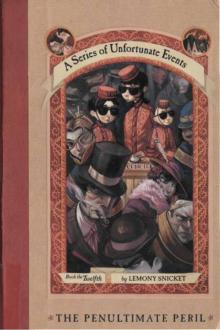 The Penultimate Peril
The Penultimate Peril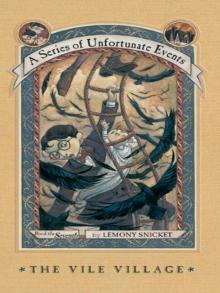 The Vile Village
The Vile Village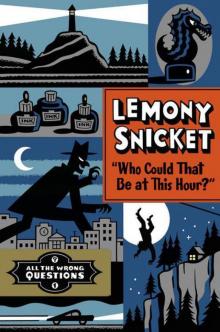 Who Could That Be at This Hour?
Who Could That Be at This Hour?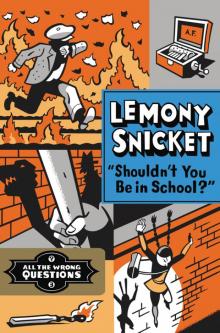 Shouldn't You Be in School?
Shouldn't You Be in School?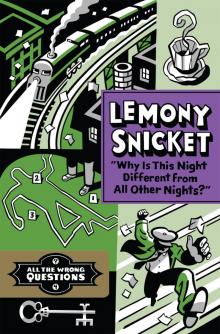 Why Is This Night Different From All Other Nights?
Why Is This Night Different From All Other Nights?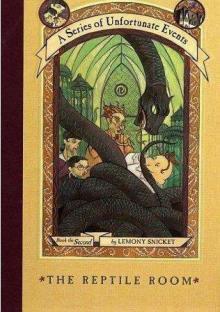 The Reptile Room
The Reptile Room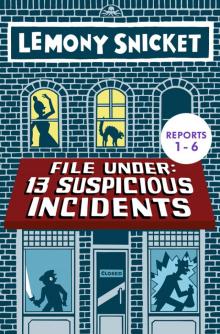 File Under: 13 Suspicious Incidents (1-6)
File Under: 13 Suspicious Incidents (1-6) The End
The End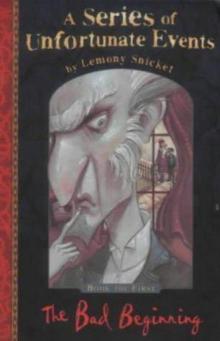 The Bad Beginning
The Bad Beginning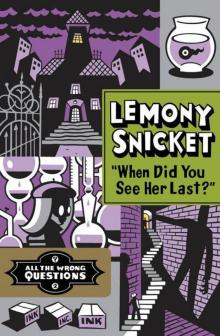 When Did You See Her Last?
When Did You See Her Last?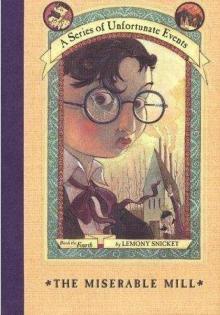 The Miserable Mill
The Miserable Mill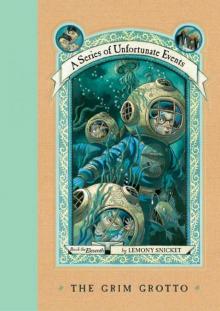 The Grim Grotto
The Grim Grotto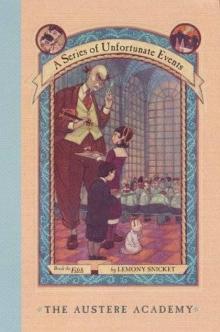 The Austere Academy
The Austere Academy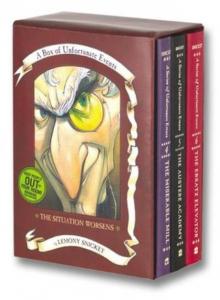 The Ersatz Elevator
The Ersatz Elevator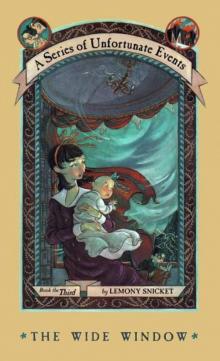 The Wide Window
The Wide Window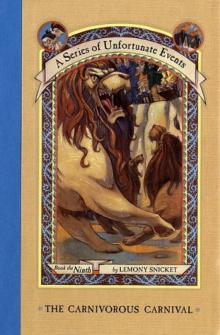 The Carnivorous Carnival
The Carnivorous Carnival A Series of Unfortunate Events Box: The Complete Wreck
A Series of Unfortunate Events Box: The Complete Wreck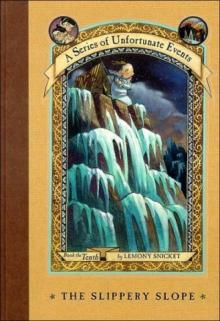 The Slippery Slope
The Slippery Slope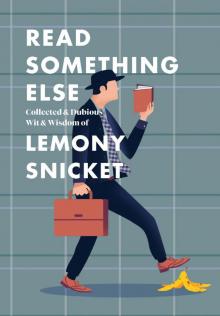 Read Something Else
Read Something Else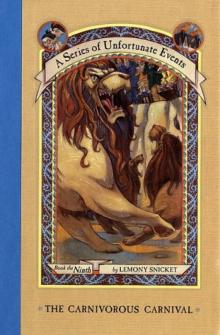 The Carnivorous Carnival asoue-9
The Carnivorous Carnival asoue-9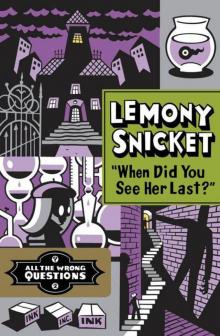 When Did You See Her Last
When Did You See Her Last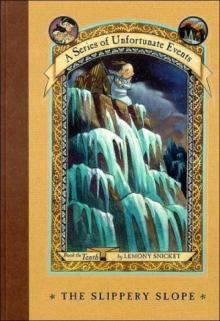 The Slippery Slope asoue-10
The Slippery Slope asoue-10 The Hostile Hospital asoue-8
The Hostile Hospital asoue-8 A Series of Unfortunate Events Collection: Books 1-13 with Bonus Material
A Series of Unfortunate Events Collection: Books 1-13 with Bonus Material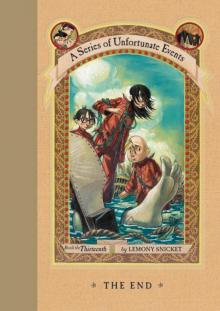 The End asoue-13
The End asoue-13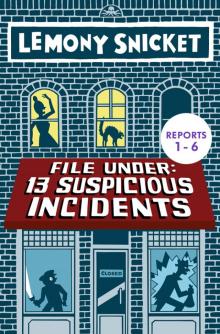 File Under
File Under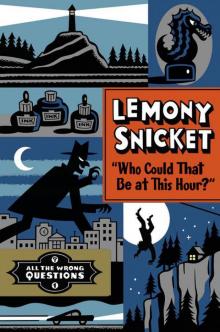 Who Could That Be at This Hour? (All the Wrong Questions)
Who Could That Be at This Hour? (All the Wrong Questions)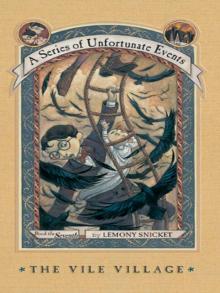 The Vile Village asoue-7
The Vile Village asoue-7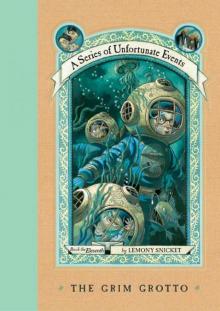 The Grim Grotto asoue-11
The Grim Grotto asoue-11